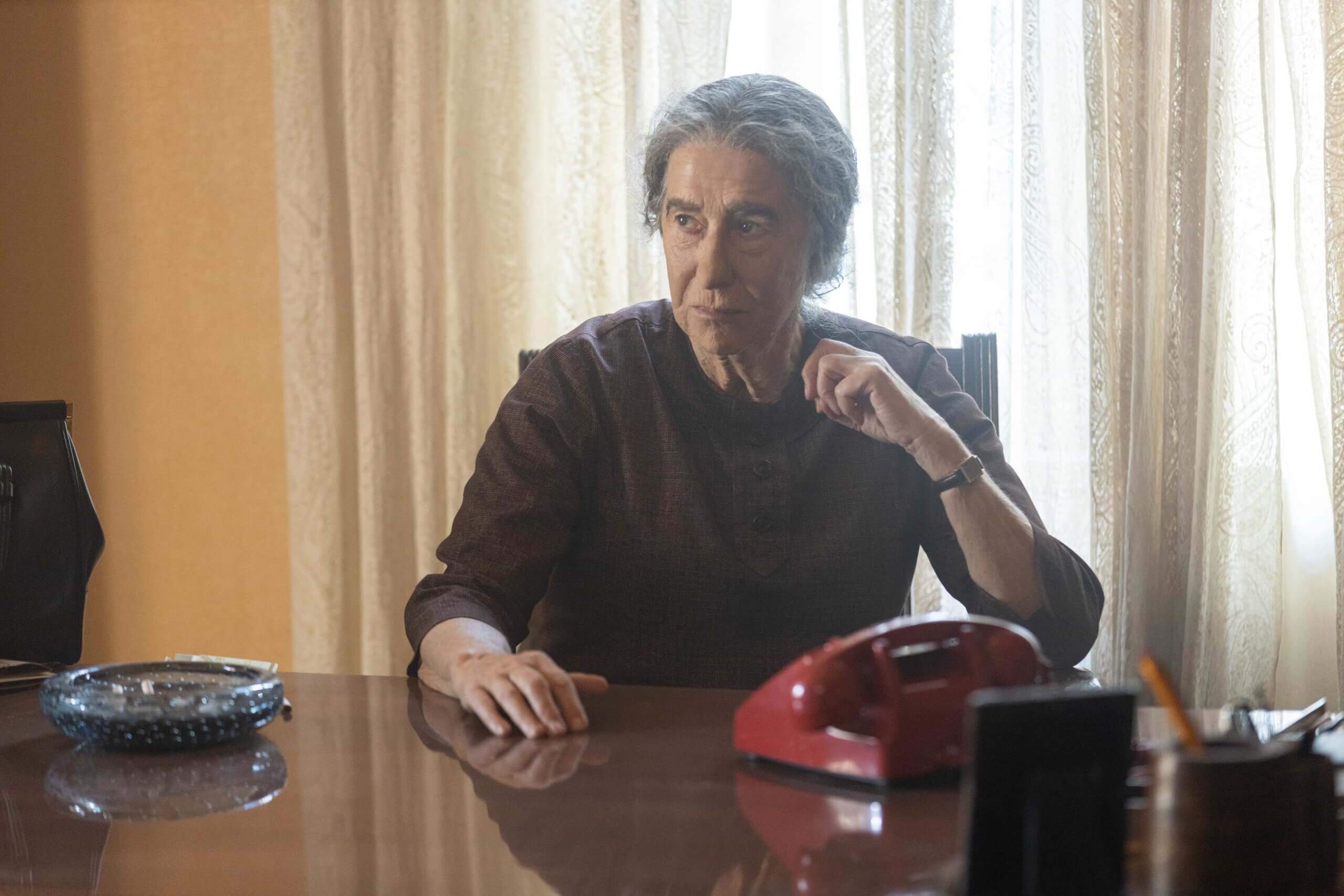Helen Mirren’s Golda is golden — but the film merely glitters
A new biopic of Israel’s fourth prime minister is too busy for its own good

Graphic by Angelie Zaslavsky
The first glimpse we get of Helen Mirren’s Golda Meir is destined to be an awards show clip for the hair and makeup department.
At first, we see her features piecemeal: A whiskered chin, a withered upper lip and creased, weary eyes. In time they converge into an image of a woman whose disparate parts — the practical shoes, the frizzy nest of hair, the cigarettes, the Wisconsin accent — were so iconic as to belie her complexity. The force of Mirren’s performance as Israel’s fourth prime minister, imbued with anguished empathy and fierce composure under pressure, elevates an otherwise overbusy film.
Indeed, one of the only aspects not overdone is the so-called “Jewface.”
Golda, out Friday, centers on Meir’s leadership during the Yom Kippur War — a conflict for which Israel was bafflingly unready, and for which Meir bore the brunt of the public backlash. (As an introductory title card put it, “Israel enters the fall of 1973 unprepared to face the consequences of their hubris.”)
Playing out largely as a chamber piece in the situation room, Golda, directed by Oscar-winner Guy Nattiv, shows Meir taking command after the Syrians and Egyptians launch a surprise attack on one of the holiest days in the Jewish calendar. (According to Nattiv, the original script was a war epic in which Meir played a much smaller role, but the production suffered pandemic budget cuts, resulting in a more intimate approach.) Almost any footage of combat is archival and, in a jarring decision, the frenzied chatter of the soldiers is in subtitled Hebrew — and, once, in Arabic — while the dialogue throughout is in English.
Rather than making the conflict seem more immediate or real, these voices and newsreels, along with captions introducing the major players, risk breaking the illusion of the drama.
Nattiv, who told the Forward’s podcast That Jewish News Show that he drew inspiration from films like Francis Ford Coppola’s surveillance thriller The Conversation, gets in his own way by introducing too many complications into a story most effectively told through Mirren’s in-the-moment reactions.
A framing device, the 1974 inquiry into Meir’s actions in the costly war, is introduced nearly as quickly as it’s forgotten. Meir’s inner turmoil is represented both by nightmares of unceasing phone calls and a curious metaphor of swarming birds. At one point, as she lies in bed, her cigarette smoke transforms into a literal fog of war, complete with the sounds of artillery fire.
But Golda is at its best when it disposes of these embellishments. Even under the prosthetics, Mirren is quite capable of presenting Meir’s tortured emotions without the poetic flourishes.
It’s the simple scenes that convey the film’s stakes most effectively. I’d gladly swap the poetry of dying birds for more time with Meir and Liev Schreiber’s Henry Kissinger (perhaps the most flattering casting in biopic history). The way in which she guilts him into eating borscht made by her housekeeper, a Holocaust survivor, tells us more about Meir than a dozen nightmare sequences.
While Mirren is able to bring Meir to life in understated strokes — it helps that some of the real woman’s quips are kept intact — Nattiv and screenwriter Nicholas Martin have leaned a touch too hard on caricature for the people around her. While Meir’s tough constitution is illustrated in a scene where she coughs up blood (she had lymphoma) after a tense call with Kissinger, it’s contrasted against a cartoonishly quaking General Moshe Dayan (Rami Heuberger), who vomits in a late night flyover of the northern front.
Nattiv stops short of Meir worship, painting her as brusque and uncompromising. He also allows her to feel every death, marking each fallen soldier a notebook. Through the extraneous inquiry scenes, in which she appears shattered by remorse, he lets us forgive her for not “trusting her gut” about the imminent war.
The anger Meir faced in the aftermath, which culminated in her resignation in 1974, is only briefly touched on — most poignantly through the mother of a soldier, who serves as a stenographer during the war room meetings. But there can be no doubt that the film has a fundamentally rosy view of Meir’s levelheaded approach to the crisis, with an end card reading, “Her legacy of saving her country from annihilation leading to peace serves as her memorial.”
The problem with Meir, as is the case with any historical figure with a long career, is that there is no consensus about her legacy. As Ambassador Deborah Lipstadt’s new biography makes clear, the diaspora view her differently than Israelis. Golda can never be definitive, but Mirren’s portrait, which never approaches caricature despite her hours in the makeup chair, may be as close as anyone’s come to capturing what she was like, both at her best and at her worst.

















